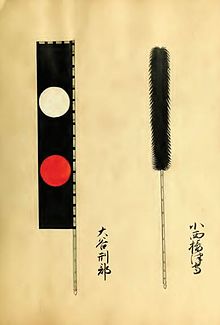Konishi Yukinaga

Konishi Yukinaga (小西 行長, baptised under the personal name Agostinho (Portuguese for Augustine); 1555 – November 6, 1600) was a Kirishitan daimyō under Toyotomi Hideyoshi.
Early life
Konishi Yukinaga was the son of a wealthy Sakai merchant, Konishi Ryūsa. His wife was also baptised under the name of Maria.[1]
In 1587, during the Invasion of Kyushu, he quelled the local uprising in Higo Province and was awarded a fief in that province.
Invasion of Korea
Yukinaga led the initial forces under Toyotomi Hideyoshi to invade Korea in the Seven-Year War. He was noted for his role in the capture of Busan and Seoul and the defensive at Pyongyang. Afterwards, his vassal, Naitō Joan acted as the envoy to negotiate peace with Chinese Ming dynasty.
In order to achieve peace, he negotiated with the Chinese negotiator Shen Weijing (沈惟敬) to inform Toyotomi Hideyoshi the Chinese surrender and to inform the Ming the Japanese surrender. Later, a Ming envoy came to Japan to award Toyotomi the position of the King of Japan. This enraged Hideyoshi and exposed the truth behind Yukinaga's earlier diplomatic mission and resultant deception. Despite the charge of disloyalty, Yukinaga again led forces alongside Katō Kiyomasa to invade Korea a second time. He defended Suncheon Castle, and repelled Ming (China) and Joseon allied forces.
Konishi Yukinaga married a Korean Christian woman. Julia was adopted as her name.[2]

Battle of Sekigahara
After Hideyoshi's death, Yukinaga joined Mōri Terumoto's side during the Battle of Sekigahara, but was ultimately defeated. He fled to Mount Ibuki, but was captured by Takenaka Shigekado's forces. Being a Christian, Yukinaga refused to commit suicide and was executed.
Popular culture
- Portrayed by Jung Sung-ho in the 2004-2005 KBS1 TV series Immortal Admiral Yi Sun-sin.
References
- ^ Sansom, George Bailey, A History of Japan, 1334–1615, page 383; Stanford University Press, 1961.
- ^ Daniel Tudor (2012). "4 Christianity". Korea: The Impossible Country. Tuttle Publishing. ISBN 146291022X. Retrieved 2014-02-02.
